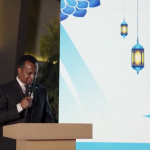Yesterday’s approval of the Procedure for Amending the Provisional Constitution by the Federal Parliament Joint Session could be a watershed moment for Somalia.
As the Parliament embarks on the process of initiating a national debate on our Constitution, I could not help but call upon the eminent German political theorist Jürgen Habermas, whose work on democracy and public discourse has shaped the contemporary discussions on political decision-making processes. His juxtaposition of the “lifeworld” and the “system” perhaps best helps us understand the difference between the Constitutional Review Process of up to today versus how it can hopefully unfold from now on. To utilize his framing, the constitution-making process in Somalia before today resembled the “system world”. To apply it in our context, it is one in which discussions of serious national issues are limited to the top leaders, national leadership forum, commissions, committees, and technical experts. In a nutshell, decision-making and discourse on politically contentious is restricted to the privileged few. Habermas criticizes the “system”, i.e., as exemplified by our Constitutional Review Process, as undemocratic, lacking communicative deliberation, and absence of the broader public sphere deliberations, and moral and ethical considerations that should inform the making of collective decisions.
In contrast, Habermas’ conceptualization of the “lifeworld” in the context of Somalia’s constitutional making process, as we hope it would be from now on, would mean opening up the dialogue to a broader spectrum of societal actors, including ordinary citizens, community leaders, civil society organizations, youth, women, and various interest groups forging the way for a constitution that resonates with the lived realities of the people, ensuring that it is not just a product of elite negotiation but a reflection of the collective aspirations and concerns of the entire nation.
In an era where there are both indigenous and exogenous actors that are attempting to undermine our sovereignty, it is not an over-exaggeration to correlate the absence of a finalized Constitution and the missing gaps in our state-building process with the attacks on our sovereignty. Therefore, keeping the much-needed deliberations for the finalization of the Constitution as a backburner issue is neither an option for the Somali people nor a luxury that their political leaders have during these testing times, especially the emerging weakened rules-based order.
SECURITY AND CONSTITUTIONALISM SOVEREIGNTY: WE CAN’T HAVE ONE WITHOUT THE OTHER
By any measure, the essence of statehood is about the monopolization of violence and the ability of the state to govern it is borders. Governing, here, is both about keeping the security threats from outside and internal insecurity.
In our current situation, the total elimination of Al-Shabaab requires a comprehensive security apparatus ranging from intelligence, military, and policing, which in turn requires massive financial input. If we are to uphold our sovereignty, such resources must be domestically generated through taxation and revenue mobilization. Even if we are to attract a meaningful bilateral or multilateral investment for our security sector, it is imperative that our security institutions have civilian oversight and accountability frameworks, which are to be governed by Constitutionally enshrined principles. The rationale on which the recently lifted arms embargo on Somalia had remained in place for the last 32 years was simply on the grounds that Somalia’s security institutions lacked oversight, regulations, and accountability — attributes associated with constitutional democracies. The absence of constitutional order makes our citizens and territory vulnerable to internal and external adversaries. There were times — in our not-so-ancient history — when our state became synonymous with undesirable terms such as a “failed state” and the likes of Donald Trump have used much more derogatory words on some occasions. The term “failed state” is not about the destruction of buildings, roads, and other physical and economic infrastructure; it just simply means the breakdown of rules of the game that govern the polity, i.e., the end of constitutional democratic order (assuming dictatorship is as undesired the failure of the state).
ECONOMIC GROWTH, DEVELOPMENT, AND TRADE
When it comes to economic growth development policy and the attainment of sustainable development goals, we, as a nation, have a long way to go, and in today’s world, economic growth is rarely attained through mercantilist policies. For developing countries like ours, much of our economic future hinges on our ability to create a conducive national environment that attracts foreign direct investment (FDI) and enables our nascent private sector to benefit from engagement with the global economy to transfer knowledge and technology. Large-scale investments from multilateral development banks, bilateral arrangements, and, more importantly, FDI in the private sector are only possible if we build a rule-based, full-fledged, democratic, and constitutional political system that paves the way for economic growth, job creation, and prosperity. Hence, our post-HIPC economic agenda is about fiscal federalism, fiscal transfers, taxation, revenue sharing, and resource sharing. It would be oxymoronic to assume the above objectives can be easily achieved merely through policy dialogue or technical discourse. These issues are fundamentally and foundationally political, about power-sharing and the very nature of the Somali state that ought to serve the Somali people.
Settling the political questions of power-sharing will directly impact fiscal instruments and taxation regimes put in place, subsequently affecting the revenue base. Only when we settle the constitutional Articles that provide the overarching framework can we have a meaningful discussion on the national welfare system, job creation, social services, political stability, and competitiveness in the global economy.
The Somali state is one of the many states in Eastern Africa, the African continent, and the larger world. In Sweden, where one percent of the population is currently of Somali origin, the tax-to-GDP ratio is over 40 percent. In our continent, the tax is 15.6 percent, exemplified by our neighbor, Kenya, whose tax revenue is over 15 percent.
If the rhetoric of the political elite and the most basic needs of our vulnerable citizens are to be realized, we cannot continue to be part of the countries with the least revenue-generation capabilities. The club of countries with less than three percent revenue-to-GDP ratio are neither attractive nor in line with our aspirations.
When given the opportunity, from Eastern to Southern Africa, from the Middle East to Europe and America, the world has seen our citizens’ exceptional capabilities, creativity, and productivity.
POLITICAL INSTITUTIONS
On the purely political questions about the nature of the state and the two foundational processes of democratization and federalization, which collectively deal with the sensitive issues of political participation and representation must be deliberated. Ultimately, it is about time that we collectively take head-on the exercise and organization of power.
These loaded questions must be unpacked, dissected, publicly deliberated, contested, and aggregated in the public domain. In essence, politics, at the end of the day, is all about aggregating the diverging societal views into common and collective objectives.
Therefore, the pending political decisions of adopting a majoritarian or proportional electoral system and a parliamentary or presidential form of governance, establishing the status of the capital city, the type of our federalism, etc., are not rocket science questions that should keep getting postponed and handed over from one government to the other.
In the last 30 years, dozens of African countries and others have discussed and deliberated these issues within their own context and at last reached a consensus. I doubt if there is any other country that outperforms us when it comes to prolonging the constitution-making process — from South Africa to Kenya, Seri Lanka to Pakistan.
Over 100 democracies of various types and close to 30 federations with much deeper divisions, heterogeneity, and religious and ideological differences have, at one point in their history, concluded the debate on these issues and made contentious choices. It is about time that we, as Somalis, go down that path and depart with the negativities that have tainted the image of our nation and state.
During the period between 2000 and 2012, the Transitional Federal Charter for the Somali Republic and the Provisional Constitution were produced. The question is: what constitutional progress has been made in Somalia from 2012 to 2024? As a former Minister of Constitutional Affairs, I can attest to the fact that the only missing link is the political will to have deliberations on the above political issues.
The political leaders and stakeholders have answers to provide to the Somali public.
In conclusion, perhaps the following scenarios should compel us to think more seriously about the constitutional agenda and the need for a social contract between the state and the citizens than we have done before.
What do we tell the dependents of the soldiers martyred in the outskirts of Caad – as we speak at this hour – if the state fails to provide them with the social benefits and tailored schemes they ought to be entitled to?
What do we tell the young Somali who is about to risk her or his life crossing the Mediterranean Sea and the forests of the Americas, seeking a better life in Europe and North America, if the state is unable to create opportunities for them here in Somalia?
Do we leave our young boys vulnerable to recruitment by Al-Shabaab as foot soldiers because we cannot provide them access to education? Radical groups, including Al-Shabaab, originate and thrive only in non-governable spaces, and governmentality in modern times is about constitutionality.
What do we tell the Somali mother enduring years in IDP camps, fluctuating between the risk of famine and floods, if the state is unable to provide her essential social services? Can she continue being dependent on humanitarian aid for the rest of eternity?
What do we offer the people of Somaliland, whose leaders recently found their way into the Ethiopian hinterland, if we are unable to address their political grievances through the constitutional framework? The concern of Somaliland is not cultural, ethnical, communal, or even ideological; it is a political and constitutional issue that has gone on for 32 years. Had it been resolved earlier, Ethiopia would not have dared to dream about its current fantasies and adventures.
For the current Parliament, there is none more honorable a task than to initiate a national dialogue on key tenants of the Constitution.
In contemporary Somalia, there could be a lot of other possibilities; however, developing a constitution aligned with the interest of the few or any particular parochial groups is most certainly not a possibility. With that knowledge, the only possibility worth pursuing is the search for ideas, arrangements, and political settlements that may not satisfy the particular interests of any group but are acceptable to all.
I hope and remain optimistic that the parliamentary debates will be informative, constructive, and contentious in a civilized way and shed light on the path to our shared future and collective destiny. A Somalia under whose Constitution every citizen as an individual or as part of a community or region can live in dignity and prosperity.
By: Salah Ahmed Jama
Deputy Prime Minister of the Federal Government of Somalia.





